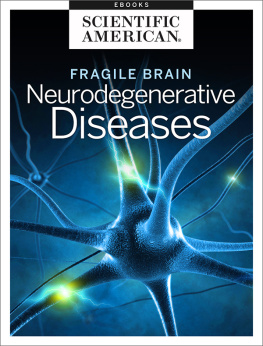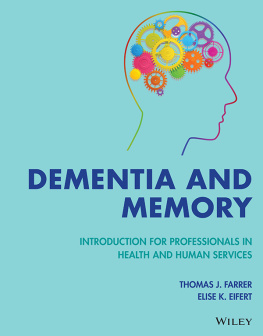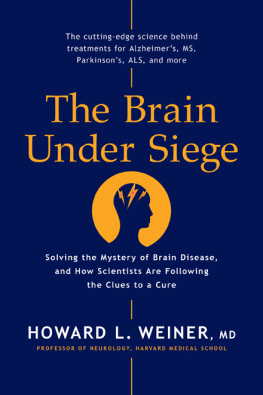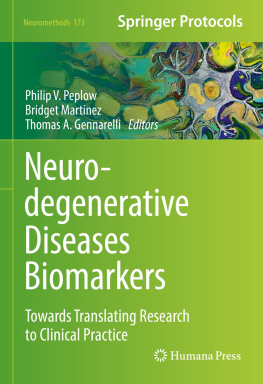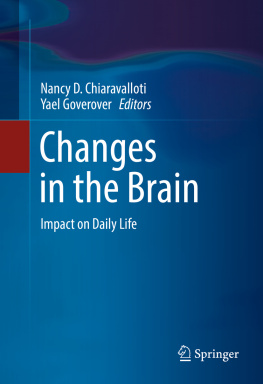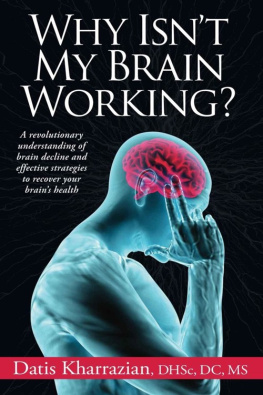Fragile Brain:
NEURODEGENERATIVE DISEASES
From the Editors of Scientific American
Cover Image: Getty Images/iStockphoto/Thinkstock Images
Letters to the Editor
Scientific American
One New York Plaza
Suite 4500
New York, NY 10004-1562
or editors@sciam.com
Copyright 2017 Scientific American, a division of Nature America, Inc.
Scientific American is a registered trademark of Nature America, Inc.
All rights reserved.
Published by Scientific American
www.scientificamerican.com
ISBN: 978-1-4668-5908-1


FRAGILE BRAIN:
NEURODEGENERATIVE DISEASES
From the Editors of Scientific American
Table of Contents
Introduction
by Karin Tucker
Section 1
1.1
by Lary C. Walker & Mathias Jucker
1.2
by Ingfei Chen
1.3
by Katie Free
1.4
by Roni Jacobson
1.5
by Simon Makin
Section 2
2.1
by Peter H. St. George-Hyslop
2.2
by Joel N. Shurkin
2.3
by Gary Stix
2.4
by Gary Stix
Section 3
3.1
by Andres M. Lozano & Suneil K. Kalia
3.2
by Nikhil Swaminathan
3.3
by Sara Chodosh
Section 4
4.1
by Patrick Aebischer & Ann C. Kato
4.2
by Amy Yee
Section 5
5.1
by Jacqueline C. Tanaka & Gregg B. Wells
5.2
by Larry Greenmeier
Section 6
6.1
by James D. Bowen
6.2
by Julianne Chiaet
6.3
by Bret Stetka
6.4
by Gary Stix
Section 7
7.1
by Elena Catteaneo, Dorotea Rigamonti & Chiara Zuccato
7.2
by Chiara Zuccato & Elena Catteaneo
Section 8
8.1
by Miia Kivipelto & Krister Hkansson
8.2
by David A. Bennett
8.3
by Esther Landhuis
8.4
by Lydia Denworth
Exploring Degenerative Brain Disease
Neurodegenerative disorder is the term used to describe the gradual loss of structure, function or death of neurons. Diseases including Alzheimers, Parkinsons, amyotrophic lateral sclerosis (ALS), chronic traumatic encephalopathy (CTE) and Huntingtons disease arise as a result of neurodegenerative processes. According to the American Academy of Neurology, these diseases and forms of dementia affect an estimated one in six Americans, and in in this eBook, Fragile Brain: Neurodegenerative Diseases, we examine the ongoing fight to understand the causes of these conditions and find therapies to reverse or prevent nerve damage and loss.
We begin our exploration into degenerative brain conditions by looking at the roots and triggers of dementia and other lesser-known conditions like frontotemporal and Lewy body dementias. The Seeds of Dementia by Lary C. Walker and Mathias Jucker concentrates on prions and protein folding as the main culprits in Alzheimers and other neurodegenerative diseases. Later in Section 1, Ingfei Chen explores how the life of an accomplished and once vibrant woman is affected by frontotemporal dementia (FTD) in When Character Crumbles. In FTD, the brains frontal and temporal regions degenerate, robbing an individual of their emotions and empathy and effecting social and personal behavior. Here researchers discuss the difficulty of diagnosing FTD and prospects of future treatments.
In Section 2, we focus on Alzheimers disease. Alzheimers affects 48 million people worldwide, including 5.4 million people in the United States, and is the cause of 60-70% of all cases of dementia. Symptoms begin with short-term memory loss and advance to disorientation, mood swings, declining self-care and the loss of bodily functions. In this section, we explore the genetic and biological factors that lead to the disease and the future of early detection and treatment. Weve included two articles by Gary Stix, Alzheimers: Forstalling the Darkness and Lifting the Curse of Alzheimers, that report on ongoing research into a cluster of Columbian families that experience early onset symptoms. Researchers studying these families genes hope that results will reveal clues about the course of the disease and possible future remedies.
Next we take a look at Parkinsons disease, which affects close to 500,000 Americans. Symptoms include shaking, slowness in movement and difficulty walking. In Andres M. Lozano and Suneil K. Kalias New Movement in Parkinson's, the authors outline abnormal cell behavior and genetic mutations that may be behind the disease. Subsequent articles look at traumatic brain injury and the death of norepinephrine cells in the brain as other potential triggers for the disorder.
In the next sections Playing Defense against Lou Gehrigs Disease, authors Patrick Aebischer and Ann C. Kato review the progress made in understanding amyotrophic lateral sclerosis (ALS). Then, Sophie Yee examines new research into why eye muscles tend to last longer than other motor neurons in ALS and what this may mean for treatment.
Also in this collection, we look at the prevailing theories on the origins and the current therapies for multiple sclerosis (MS) and Huntingtons disease. The cause of MS remains unknown, but new evidence has opened up new lines of inquiry. In one piece, we look at why researchers are turning to gray matter, as opposed to white matter, as the starting point for the disease. In another, researchers examine the autoimmune theory, which speculates that the myelin degradation in MS results from the immune system turning on itself. Recent studies suggest the aberrant response begins in the gut.
Even though the definitive roots of neurodegenerative diseases are unknown, there are specific occurrences that link them all. These include genetic mutations, protein misfolding in neurons and intercellular mechanical dysfunction. We wrap up this collection by looking at current preventative measures and treatments that target not only disease pathology, but also lifestyle changes as well. In A Rare Success against Alzheimers, the results of a large-scale Finnish study provide evidence that choices such as diet and exercise can help prevent cognitive decline. Although this news is far from a cure, forward movement against Alzheimers and neurodegenerative disease in general is reason for optimism. As research and evidence accumulates, we get ever closer to curative therapies that can halt the debilitation and death of neurons.
--Karin Tucker
Book Editor
Seeds of Dementia
By Lary C. Walker and Mathias Jucker
Under a microscope, a pathologist searchingthrough the damaged nerve cells in a braintissue sample from a patient who has died ofAlzheimers disease can make out strangeclumps of material. They consist of proteinsthat clearly do not belong there. Where didthey come from, and why are there so manyof them? And most important, what do theyhave to do with this devastating and incurabledisorder? The search for answers hasturned up a startling discovery: the clumped proteins in Alzheimersand other major neurodegenerative diseases behave very much likeprions, the toxic proteins that destroy the brain in mad cow disease.
Prions are misshapen yet durable versions of proteins normally present in nerve cells thatcause like proteins to misfold and clump together, starting a chain reaction that eventually consumesentire brain regions. In the past 10 years scientists have learned that such a process may beat work not only in mad cow and other exotic diseases but also in major neurodegenerative disorders,including Alzheimers, Parkinsons, amyotrophic lateral sclerosis (also known as ALS or LouGehrigs disease) and the concussion-related dementia of football players and boxers.

